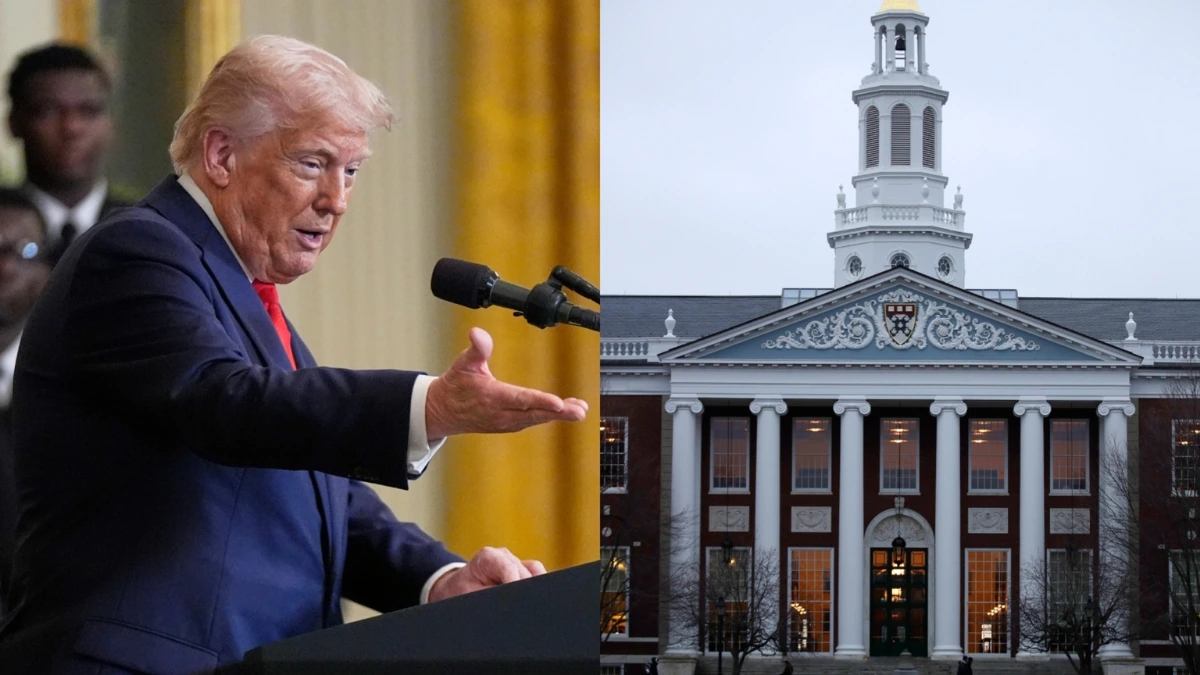
U.S. President Donald Trump sharply criticised a federal judge presiding over a significant case involving Harvard University on Monday, further escalating relations with the country’s academic elite. Trump warned that billions of dollars in government funding to Harvard could be at risk and accused the judge, who was appointed by former President Barack Obama, of political prejudice.
Even before the judge rendered a decision, Trump blasted her as “a TOTAL DISASTER” in a vehement Truth Social post. Trump stated, “She is an automatic ‘loss’ for the people of our country and has systematically taken over the various Harvard cases.”
His remarks coincided with Harvard’s appearance in federal court to challenge the contentious $2.6 billion federal funding cut initiative by the Trump administration. The institution claims that the cuts are politically driven and that they go against administrative and legal standards.
President Donald Trump Urges Washington and Cleveland Sports Teams to Restore Original Names
Mounting Political Pressure on Academia

Trump’s most recent statements are a part of an expanding effort by his administration to force American colleges and universities—especially those in the Ivy League—to adopt what he refers to as “American values.” The White House has been accusing Harvard University of political prejudice, liberal activism, and antisemitic sentiments for months; the university vehemently disputes these claims.
According to Trump’s article, Harvard University is anti-Semitic, anti-Christian, and anti-America. In addition, he questioned how a judge he characterised as “hating Trump” was given such a prominent and politically fraught case.
Legal professionals and human rights activists have criticised the president for repeatedly labelling the judge as biassed in the absence of any evidence of misconduct. Such rhetoric, according to many, jeopardises the judiciary’s independence and erodes public trust in the judicial system.
Focus on Harvard University’s Wealth and Influence

Trump once again targeted Harvard University’s enormous endowment, which currently stands at over $50 billion, in addition to denouncing the court and university officials. He said that Harvard had unfairly profited from federal funding that should have gone to less affluent or smaller universities, writing, “Harvard University has $52 billion dollars sitting in the bank.”
“A large portion of this funding originates in the United States, all at the expense of other educational institutions,” Trump asserted. “We will not permit this unjust circumstance to continue.”
In the administration’s case, this argument has taken the stage. According to officials, prestigious colleges with substantial financial reserves ought to depend less on federal funding, particularly if their cultures and policies are thought to be at odds with the interests of the country as a whole.
4 Excellent ProtonMail Alternatives for Personal and Business Use
Protests and Legal Uncertainty

In support of Harvard University, demonstrators gathered outside the federal courthouse in Boston, calling on the judge to restore the lost funding and denouncing what they perceive to be politically driven meddling in the educational process. Reflecting the broader national division over the place of higher education in American life, protesters carried posters denouncing authoritarian practices, academic suppression, and censorship.
Trump stated during the court proceedings that he is ready to take the matter to a higher court and that he expects a decision that would be against his administration. “We will immediately appeal—and win—if she rules against us,” he said. “Until victory is achieved, the Trump Administration will not give up.”
Additionally, he pledged to conduct a more thorough examination of the distribution of federal monies to colleges. Trump declared, “The government will end the practice of giving Harvard University billions of dollars, many of which had been given without explanation.” “This is over now.”
House Passes Historic Crypto Bill, Paving Way for Federal Stablecoin Rules
A Broader Culture War in Higher Education

Harvard University’s legal dispute is a part of a larger effort by Trump and his administration to change American higher education. In addition to restricting free speech and encouraging intolerance towards conservative and religious views, the president has frequently charged colleges and universities with spreading “radical left” ideology.
Public money should be linked to academic accountability, political neutrality, and respect for ideological diversity, according to the White House. Critics contend that these ideas are politically biassed and ill-defined.
Harvard university, for its part, claims that the budget cuts are retaliatory in nature and says it is still dedicated to academic quality, diversity, and open discourse. According to university administrators, the cuts would hurt not only Harvard but also a variety of federally funded research initiatives and community services.
US Tariff Threat Targets Transhipment of Chinese Goods via Trade Partners
The Broader Implications
The $2.6 billion in challenged funding is only one aspect of this issue; it has the potential to completely alter the dynamic between the federal government and the country’s universities. The legal protections that shield academic institutions from political meddling could be upheld in a decision against the Trump administration. However, if the administration wins, it might usher in a new era when institutions must adhere to government-approved policies or beliefs in order to get federal funds.
Much will depend on the judge’s ruling as the case progresses, as well as whether the administration will fulfil its pledge to change the way federal funds are allocated to higher education. The dispute has turned into a focal point in a wider conflict, with one side advocating for radical reforms to control prestigious colleges and the other side upholding the autonomy and intellectual freedom that have long characterised American higher education.
